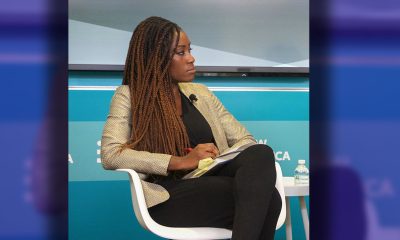Black History
Colin Powell: ‘Not Allowed to Fail’
Via jobs as military assistant to high-level government officials and a stint as national security adviser to then-President Ronald Reagan, Powell rose quickly through the ranks. He became the youngest and first Black chairman of the Joint Chiefs. He was instrumental in the 1991 Persian Gulf War victory but struggled over the U.S. invasion of Iraq in 2003—at which time he was serving as secretary of state under then-President George W. Bush, Powell’s most difficult assignment.

By Tamara Shiloh
Gen. Colin Powell (1937–2021), born in Harlem to Jamaican immigrant parents Luther and Maud Powell, rose to the highest reaches of the U.S. military: four-star general. He would go on to become the country’s first Black Secretary of State. His successes weren’t without support and the foundation set early on.
Propelling Powell to exceed his own expectations were those of his parents: “We were not allowed to fail,” he said during a 2006 New York Daily News interview. Powell said those words “didn’t mean you had to be a general or a doctor or a lawyer. In fact, that was the furthest thing from my mind when I was a kid in New York City. But you had to stay in school, and you had to do well, and you had to meet (their) expectations: ‘We didn’t come to this country for the next generation to blow it.’”
Powell’s childhood was storied. Raised in a four-bedroom, third-floor apartment on Kelly Street in the South Bronx, Powell came from modest means. His father worked in Manhattan’s Garment District, and his mother was a seamstress. He often said that he loved his tenement neighborhood.
Surrounded by a large extended family as well as people of varied cultures, Powell described his childhood experiences in New York City as being exposed to “every type of person you could imagine,” and that it “meant so much to me as I grew up and learned the importance of diversity.”
Powell attended New York City’s public schools before enrolling at City College of New York and later earning an MBA from George Washington University. It was at City College that he found his calling: The Reserve Officer Training Corps program. He began to build relationships that later led him to the U.S. Army—a move that would eventually direct his future.
Via jobs as military assistant to high-level government officials and a stint as national security adviser to then-President Ronald Reagan, Powell rose quickly through the ranks. He became the youngest and first Black chairman of the Joint Chiefs. He was instrumental in the 1991 Persian Gulf War victory but struggled over the U.S. invasion of Iraq in 2003—at which time he was serving as secretary of state under then-President George W. Bush, Powell’s most difficult assignment.
As the Pentagon’s top officer, Powell, who viewed himself as a problem-solver, called for “applying military might only with overwhelming and decisive troop strength, a clear objective, and popular support,” the Washington Post reported. Journalists later dubbed this method “the Powell Doctrine.”
Interestingly, throughout his career, Powell avoided racial activism. He believed “race factored much less in his professional success than his ability to work within institutions, where he competed with whites on their own terms,” according to the Washington Post. “My race is somebody’s else’s problem … It’s not my problem,” he had said.
After retiring from public service, spending time on the lecture circuit, and becoming founding chair of America’s Promise, Powell died Oct. 18, 2021. He was 84.
Activism
Oakland Post: Week of November 26 – December 2, 2025
The printed Weekly Edition of the Oakland Post: Week of November 26 – December 2, 2025

To enlarge your view of this issue, use the slider, magnifying glass icon or full page icon in the lower right corner of the browser window.
Activism
Oakland Post: Week of November 19 – 25, 2025
The printed Weekly Edition of the Oakland Post: Week of November 19 – 25, 2025

To enlarge your view of this issue, use the slider, magnifying glass icon or full page icon in the lower right corner of the browser window.
Activism
IN MEMORIAM: William ‘Bill’ Patterson, 94
Bill devoted his life to public service and education. In 1971, he became the founding director for the Peralta Community College Foundation, he also became an administrator for Oakland Parks and Recreation overseeing 23 recreation centers, the Oakland Zoo, Children’s Fairyland, Lake Merritt, and the Henry J. Kaiser Convention Center.

William “Bill” Patterson, 94, of Little Rock, Arkansas, passed away peacefully on October 21, 2025, at his home in Oakland, CA. He was born on May 19, 1931, to Marie Childress Patterson and William Benjamin Patterson in Little Rock, Arkansas. He graduated from Dunbar High School and traveled to Oakland, California, in 1948. William Patterson graduated from San Francisco State University, earning both graduate and undergraduate degrees. He married Euradell “Dell” Patterson in 1961. Bill lovingly took care of his wife, Dell, until she died in 2020.
Bill devoted his life to public service and education. In 1971, he became the founding director for the Peralta Community College Foundation, he also became an administrator for Oakland Parks and Recreation overseeing 23 recreation centers, the Oakland Zoo, Children’s Fairyland, Lake Merritt, and the Henry J. Kaiser Convention Center.
He served on the boards of Oakland’s Urban Strategies Council, the Oakland Public Ethics Commission, and the Oakland Workforce Development Board.
He was a three-term president of the Oakland branch of the NAACP.
Bill was initiated in the Gamma Alpha chapter of Kappa Alpha Psi Fraternity.
In 1997 Bill was appointed to the East Bay Utility District Board of Directors. William Patterson was the first African American Board President and served the board for 27 years.
Bill’s impact reached far beyond his various important and impactful positions.
Bill mentored politicians, athletes and young people. Among those he mentored and advised are legends Joe Morgan, Bill Russell, Frank Robinson, Curt Flood, and Lionel Wilson to name a few.
He is survived by his son, William David Patterson, and one sister, Sarah Ann Strickland, and a host of other family members and friends.
A celebration of life service will take place at Henry J. Kaiser Convention Center (Calvin Simmons Theater) on November 21, 2025, at 10 AM.
His services are being livestreamed at: https://www.facebook.com/events/1250167107131991/
In lieu of flowers, donations can be made to the Euradell and William Patterson scholarship fund TBA.

-

 Activism3 weeks ago
Activism3 weeks agoOakland Post: Week of November 12 – 18, 2025
-

 Activism4 weeks ago
Activism4 weeks agoOakland Post: Week of November 5 – 11, 2025
-

 Activism2 weeks ago
Activism2 weeks agoIN MEMORIAM: William ‘Bill’ Patterson, 94
-

 Activism3 weeks ago
Activism3 weeks agoHow Charles R. Drew University Navigated More Than $20 Million in Fed Cuts – Still Prioritizing Students and Community Health
-

 #NNPA BlackPress3 weeks ago
#NNPA BlackPress3 weeks agoThe Perfumed Hand of Hypocrisy: Trump Hosted Former Terror Suspect While America Condemns a Muslim Mayor
-

 #NNPA BlackPress3 weeks ago
#NNPA BlackPress3 weeks agoProtecting Pedophiles: The GOP’s Warped Crusade Against Its Own Lies
-

 Bay Area3 weeks ago
Bay Area3 weeks agoNo Justice in the Justice System
-

 #NNPA BlackPress4 weeks ago
#NNPA BlackPress4 weeks ago2026 Subaru Forester Wilderness Review: Everyday SUV With Extra Confidence


























































